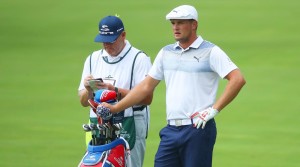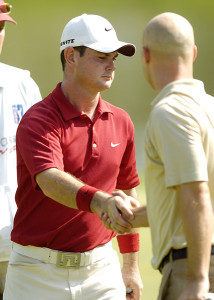There isn’t much that John Feinstein writes that I don’t enjoy. He’s as connected as any sportswriter ever could be and his opinions on issues and people are usually dead on. This week in GolfWorld he has a familiar rant, “Isn’t it time pro golf fixes its slow-play problem?”
It’s a question often asked but never answered by the PGA Tour. For generations PGA golfers have gotten progressively slower and slower. And it’s to the point now that twosomes take five hours to finish eighteen holes. That’s just plain sickening.
Feinstein laments that even the greatest golfers of their day were guilty of perpetuating the problem.
“It was Mark Russell, the long-time PGA Tour rules official, who summed up the ongoing issue of slow play not long after what remains one of the most famous pace-of-play brouhahas of all time, the clash in 2005 between
Rory Sabbatini and Ben Crane: “We’ve got a very simple problem out here,” he said. “We’ve got players who want to go 120 miles an hour and then we’ve got players going about 40, sometimes less. We’d like to see everyone between 55 and 65. As it is, there are bound to be problems.”
Pace of play has been an issue in golf since the Scots first laid out St. Andrews. Jack Nicklaus played at 40 (on a good day). Tom Watson and Tom Kite were well over 70. Curtis Strange was closer to 40—and Nick Faldo and Bernhard Langer were considerably slower than that.
Arnold Palmer was around 70. In 1994, after completing his first round of his final U.S. Open in near darkness after taking five-plus hours getting around Oakmont Country Club, Palmer shook his head and said, “In the old days, we never took more than four-and-a-half hours, and that was even with Jack on the golf course.”
Newcomers to the “Slow Play Club” are the hottest golfer around, Bryson DeChambeau along with Jason Day who join fellow renowned slow-pokes Ben Crane, J.B. Holmes and Kevin Na for their leisurely strolls around the course.
“The latest example came this past weekend at the Dubai Desert Classic, where the eventual winner, Bryson DeChambeau marched to a seven-stroke victory … one tedious step at a time. By the clock of our John Huggan, DeChambeau took more than a minute to prepare for his birdie putt on the 72nd hole, a comical amount of time given his win was already assured. This came after he took one minute, 45 seconds over a putt on the 15th hole—and he wasn’t the first to putt in his group.”
I have nurtured the habit of clicking to another channel when the directors switch to DeChambeau doing his calculations knowing full well I have a minute or two to check out something else. But it is down right painful to watch. Especially when CBS, NBC and The Golf Channel insist on more chatter from their talking heads rather than showcasing more shots. And actual shots I mean, not “pre-shot” BS.
Feinstein offers his solution, which based on the lack of action from the PGA Tour over the last decade has the same chance as DeChambeau playing a shot in under 60 seconds…which is exactly zero.
“Here’s what should happen: If you are out of position, you’re on the clock. If you get a bad time after being put on the clock, you get a one-stroke penalty. No warnings—being put on the clock is your warning—and everyone will know you were penalized. That will hit players in their wallets and embarrass them all at once. If players were regularly docked strokes for slow play, you can bet they’d pick things up long before they were even on the clock.
Rules officials will tell you that once a player gets a bad time, he will inevitably pick up the pace and, almost as inevitably, play better.
“These guys aren’t idiots,” one rules official said. “If they know a bad time is going to get them a one-stroke penalty, they get moving. Even the slow ones suddenly figure out how to play faster.”
It’s not that hard. The tour could fix about 90 percent of the problems very fast if it would only admit too many players are slow. It would be nice if they’d do something while we’re young.”
Right, as Rodney said, “while we’re young.”

